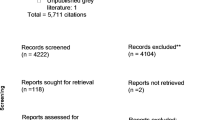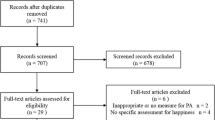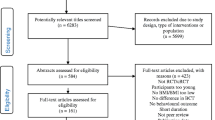Abstract
Purpose
This study evaluated the effectiveness of a self-managed home-based moderate intensity walking intervention on psychosocial health outcomes among breast cancer patients undergoing chemotherapy.
Methods
The randomised controlled trial compared a self-managed, home-based walking intervention to usual care alone among breast cancer patients receiving chemotherapy. Outcome measures included changes in self-report measures of anxiety, depression, fatigue, self-esteem, mood and physical activity. Fifty participants were randomised to either the intervention group (n = 25), who received 12 weeks of moderate intensity walking, or the control group (n = 25) mid-way through chemotherapy. Participants in the intervention group were provided with a pedometer and were asked to set goals and keep weekly diaries outlining the duration, intensity and exertion of their walking. Levels of psychosocial functioning and physical activity were assessed pre- and post-intervention in both groups.
Results
The intervention had positive effects on fatigue (F = 5.77, p = 0.02), self-esteem (F = 8.93, p ≤ 0.001), mood (F = 4.73, p = 0.03) and levels of physical activity (x 2 = 17.15, p = 0.0011) but not anxiety (F = 0.90, p = 0.35) and depression (F = 0.26, p = 0.60) as assessed using the HADS. We found an 80 % adherence rate to completing the 12-week intervention and recording weekly logs.
Conclusion
This self-managed, home-based intervention was beneficial for improving psychosocial well-being and levels of physical activity among breast cancer patients treated with chemotherapy.
Trial registration
Current Controlled Trials ISRCTN50709297.

Similar content being viewed by others
References
So WKW, Marsh G, Ling WM, Leung FY, Lo JCK, Yeung M, Li GKH (2009) The symptom cluster of fatigue, pain, anxiety, and depression and the effect on the quality of life of women receiving treatment for breast cancer: a multicenter study. Oncol Nurs Forum 36(4):E205–E214
Penttinen HM, Saarto T, Kellokumpu-Lehtinen P, Blomqvist C, Huovinen R, Kautiainen H, Järvenpää S, Nikander R, Idman I, Luoto R, Sievänen H, Utriainen M, Vehmanen L, Jääskeläinen AS, Elme A, Ruohola J, Luoma M, Hakamies-Blomqvist L (2011) Quality of life and physical performance and activity of breast cancer patients after adjuvant treatments. Psychooncology 20(11):1211–1220
Hayes SC, Rye S, Disipio T, Yates P, Bashford J, Pyke C, Saunders C, Battistutta D, Eakin E (2013) Exercise for health: a randomized, controlled trial evaluating the impact of a pragmatic, translational exercise intervention on the quality of life, function and treatment-related side effects following breast cancer. Breast Cancer Res Treat 137(1):175–186
Marcus AC, Garrett KM, Cella D, Wenzel L, Brady MJ, Fairclough D, Pate-Willig M, Barnes D, Emsbo SP, Kluhsman BC, Crane L, Sedlacek S, Flynn PJ (2010) Can telephone counseling post-treatment improve psychosocial outcomes among early stage breast cancer survivors? Psychooncology 19(9):923–932
Dolbeault S, Cayrou S, Brédart A, Viala AL, Desclaux B, Saltel P, Gauvain-Piquard A, Hardy P, Dickes P (2009) The effectiveness of a psycho-educational group after early-stage breast cancer treatment: results of a randomized French study. Psychooncology 18(6):647–656
Wilmoth MC, Coleman EA, Smith SC, Davis C (2004) Fatigue, weight gain, and altered sexuality in patients with breast cancer: exploration of a symptom cluster. Oncol Nurs Forum 31(6):1069–1075
Battaglini CL, Mihalik JP, Bottaro M, Dennehy C, Petschauer MA, Hairston LS, Shields EW (2008) Effect of exercise on the caloric intake of breast cancer patients undergoing treatment. Braz J Med Biol Res 41(8):709–715
Courneya KS, Friedenreich CM (1997) Relationship between exercise pattern across the cancer experience and current quality of life in colorectal cancer survivors. J Altern Complement Med 3(3):215–226
Davies NJ, Batehup L, Thomas R (2011) The role of diet and physical activity in breast, colorectal, and prostate cancer survivorship: a review of the literature. Br J Cancer 105:S52–S73
Mishra SI, Scherer RW, Snyder C, Geigle PM, Berlanstein DR, Topaloglu O (2012) Exercise interventions on health-related quality of life for people with cancer during active treatment. Cochrane Database Syst Rev 8:CD008465
Mishra SI, Scherer RW, Geigle PM, Berlanstein DR, Topaloglu O, Gotay CC, Snyder C (2012) Exercise interventions on health-related quality of life for cancer survivors. Cochrane Database Syst Rev 8:CD007566
T. DiSipio, S. Rye, M. Newton, L. Guy, K. Spathonis, E. Eakin, and S. Hayes, “Exercise for health : a breast cancer recovery program—quality of life benefits [Conference Abstract],” Asia Pacific Journal of Clinical Oncology [Special Issue: Abstracts of the 36th Annual Scientific Meeting, Clinical Oncological Society of Australia]. Wiley-Blackwell Publishing Ltd., 17-Nov-2009
Mutrie N, Campbell AM, Whyte F, McConnachie A, Emslie C, Lee L, Kearney N, Walker A, Ritchie D (2007) Benefits of supervised group exercise programme for women being treated for early stage breast cancer: pragmatic randomised controlled trial. BMJ 334(7592):517
Cho O-H, Yoo Y-S, Kim N-C (2006) Efficacy of comprehensive group rehabilitation for women with early breast cancer in South Korea. Nurs Health Sci 8(3):140–146
Sandel SL, Judge JO, Landry N, Faria L, Ouellette R, Majczak M (2005) Dance and movement program improves quality-of-life measures in breast cancer survivors. Cancer Nurs 28(4):301–309
Pinto BM, Frierson GM, Rabin C, Trunzo JJ, Marcus BH (2005) Home-based physical activity intervention for breast cancer patients. J Clin Oncol 23(15):3577–3587
Vallance JKH, Courneya KS, Plotnikoff RC, Yasui Y, Mackey JR (2007) Randomized controlled trial of the effects of print materials and step pedometers on physical activity and quality of life in breast cancer survivors. J Clin Oncol 25(17):2352–2359
Courneya KS, Segal RJ, Gelmon K, Reid RD, Mackey JR, Friedenreich CM, Proulx C, Lane K, Ladha AB, Vallance JK, Liu Q, Yasui Y, McKenzie DC (2007) Six-month follow-up of patient-rated outcomes in a randomized controlled trial of exercise training during breast cancer chemotherapy. Cancer Epidemiol Biomarkers Prev 16(12):2572–2578
Vadiraja HS, Raghavendra RM, Nagarathna R, Nagendra HR, Rekha M, Vanitha N, Gopinath KS, Srinath BS, Vishweshwara MS, Madhavi YS, Ajaikumar BS, Ramesh BS, Nalini R, Kumar V (2009) Effects of a yoga program on cortisol rhythm and mood states in early breast cancer patients undergoing adjuvant radiotherapy: a randomized controlled trial. Integr Cancer Ther 8(1):37–46
Mehnert A, Veers S, Howaldt D, Braumann K-M, Koch U, Schulz K-H (2011) Effects of a physical exercise rehabilitation group program on anxiety, depression, body image, and health-related quality of life among breast cancer patients. Onkologie 34(5):248–253
Backman M, Wengström Y, Johansson B, Sköldengen I, Börjesson S, Tärnbro S, Berglund Å (2014) A randomized pilot study with daily walking during adjuvant chemotherapy for patients with breast and colorectal cancer. Acta Oncol 53(4):510–520
Rogers LQ, Hopkins-Price P, Vicari S, Pamenter R, Courneya KS, Markwell S, Verhulst S, Hoelzer K, Naritoku C, Jones L, Dunnington G, Lanzotti V, Wynstra J, Shah L, Edson B, Graff A, Lowy M (2009) A randomized trial to increase physical activity in breast cancer survivors. Med Sci Sports Exerc 41(4):935–946
Fillion L, Gagnon P, Leblond F, Gélinas C, Savard J, Dupuis R, Duval K, Larochelle M (2008) A brief intervention for fatigue management in breast cancer survivors. Cancer Nurs 31(2):145–159
Cadmus LA, Salovey P, Yu H, Chung G, Kasl S, Irwin ML (2009) Exercise and quality of life during and after treatment for breast cancer: results of two randomized controlled trials. Psychooncology 18(4):343–352
Husebø AML, Dyrstad SM, Mjaaland I, Søreide JA, Bru E (2014) Effects of scheduled exercise on cancer-related fatigue in women with early breast cancer. Sci World J 2014:271828
Yang CY, Tsai J-C, Huang Y-C, Lin C-C (2010) Effects of a home-based walking program on perceived symptom and mood status in postoperative breast cancer women receiving adjuvant chemotherapy. J Adv Nurs 67(1):158–168
Jeffs E, Wiseman T (2013) Randomised controlled trial to determine the benefit of daily home-based exercise in addition to self-care in the management of breast cancer-related lymphoedema: a feasibility study. Support Care Cancer 21(4):1013–1023
Lee MK, Yun YH, Park H-A, Lee ES, Jung KH, Noh D-Y (2014) A Web-based self-management exercise and diet intervention for breast cancer survivors: pilot randomized controlled trial. Int J Nurs Stud 51(12):1557–1567
Mock V, Pickett M, Ropka ME, Muscari Lin E, Stewart KJ, Rhodes VA, McDaniel R, Grimm PM, Krumm S, McCorkle R (2001) Fatigue and quality of life outcomes of exercise during cancer treatment. Cancer Pract 9(3):119–127
F. G. Stacey, E. L. James, K. Chapman, K. S. Courneya, and D. R. Lubans, “A systematic review and meta-analysis of social cognitive theory-based physical activity and/or nutrition behavior change interventions for cancer survivors.,” J Cancer Surviv, Nov. 2014
Olander EK, Fletcher H, Williams S, Atkinson L, Turner A, French DP (2013) What are the most effective techniques in changing obese individuals’ physical activity self-efficacy and behaviour: a systematic review and meta-analysis. Int J Behav Nutr Phys Act 10(1):29
Michie S, Richardson M, Johnston M, Abraham C, Francis J, Hardeman W, Eccles MP, Cane J, Wood CE (2013) The behavior change technique taxonomy (v1) of 93 hierarchically clustered techniques: building an international consensus for the reporting of behavior change interventions. Ann Behav Med 46(1):81–95
Gollwitzer PM (1999) Implementation intentions: strong effects of simple plans. Am Psychol 54(7):493–503
Department of Health, Physical Activity, Health Improvement and Prevention (2004) At least five a week. http://www.image.guardian.co.uk/sysfiles/Society/…/04/…/At_least5aweek.pdf
Zigmond AS, Snaith RP (1983) The hospital anxiety and depression scale. Acta Psychiatr Scand 67(6):361–370
Yellen SB, Cella DF, Webster K, Blendowski C, Kaplan E (1997) Measuring fatigue and other anemia-related symptoms with the Functional Assessment of Cancer Therapy (FACT) measurement system. J Pain Symptom Manag 13(2):63–74
M. Rosenberg, “Rosenberg self-esteem scale (RSE),” Accept. Commit. Ther., p. 61, 1965.
Shacham S (1983) A shortened version of the profile of mood states. J Pers Assess 47(3):305–306
Dilorenzo TA, Bovbjerg DH, Montgomery GH, Valdimarsdottir H, Jacobsen PB (1999) The application of a shortened version of the profile of mood states in a sample of breast cancer chemotherapy patients. Br J Health Psychol 4(4):315–325
Department of Health, “The General Practice Physical Activity Questionnaire (GPPAQ).” https://www.gov.uk/government/publications/general-practice-physical-activity-questionnaire-gppaq
G. Borg, Borg’s perceived exertion and pain scales. 1998
Altman DG, Bland JM (1999) Statistics notes: how to randomise. BMJ 319(7211):703–704
Cohen J (1992) A power primer. Psychol Bull 112(1):155–159
Berterö C, Chamberlain Wilmoth M (2007) Breast cancer diagnosis and its treatment affecting the self: a meta-synthesis. Cancer Nurs 30(3):194–202
Park JH, Jun EY, Kang MY, Joung YS, Kim GS (2009) [Symptom experience and quality of life in breast cancer survivors]. J Korean Acad Nurs 39(5):613–621
Acknowledgments
We would like to thank all participants who have agreed to take part in the clinical trial and have given us their time and input into the study.
Conflict of interest
There are no conflicts of interest to report and we certify that the article is original work.
Competing interests
The study is funded by Loughborough University as part of a PhD project.
Author information
Authors and Affiliations
Corresponding author
Additional information
This activity was conducted under the auspices of the National Centre for Sport and Exercise Medicine (NCSEM) England, a collaboration between several universities, NHS trusts and sporting and public bodies. The views expressed are those of the authors and not necessarily those of NCSEM England or the partners involved.
Appendix: Intervention booklet
Appendix: Intervention booklet

















Rights and permissions
About this article
Cite this article
Gokal, K., Wallis, D., Ahmed, S. et al. Effects of a self-managed home-based walking intervention on psychosocial health outcomes for breast cancer patients receiving chemotherapy: a randomised controlled trial. Support Care Cancer 24, 1139–1166 (2016). https://doi.org/10.1007/s00520-015-2884-5
Received:
Accepted:
Published:
Issue Date:
DOI: https://doi.org/10.1007/s00520-015-2884-5




